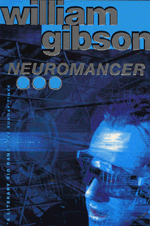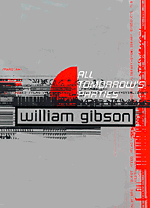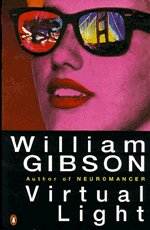William Gibson : All Tomorrow's Parties : Waiting For The Man (original) (raw)
Antony Johnston has a meeting of minds with the elusive William Gibson about his new novel All Tomorrow’s Parties
William Gibson needs no introduction. But he’s going to get one anyway.
Gibson coined the term ‘cyberspace,’ visualising a worldwide communications net eleven years before the World Wide Web was born. His debut novel Neuromancer won all three major science fiction awards — the Hugo, Nebula and Philip K Dick — upon its release. He is the first name that comes to mind when the term ‘Cyberpunk’ is mentioned, known and revered the world over by authors, artists, rock bands and more.
Yet Gibson the man remains startlingly elusive. A professional novelist for fifteen years, he has published only seven novels (one of which was co-written) and most of his reputation remains, somewhat unfairly, rooted in Neuromancer. He lives a quiet life with his wife and children in Canada. In a staggering display of irony, for many years Gibson refused to even have an Internet connection, saying the last thing he wanted after a day staring at his word processor was to carry on using the computer. Even now, at the height of his success and in his mid-forties, he continues to quietly support innovative, street-level art.
But despite being trapped in a Leonard Nimoy-style cage of Neuromancer’s success, Gibson continues to innovate himself both in style and concept. He does not rest on his laurels, and looks set to burst forth into the popular mindset for a second time.
His latest novel, All Tomorrow’s Parties, is released next month. He is continuing his work in television after the success of his X-Files episode ‘Killswitch’. And the highly-anticipated, oft-speculated film adaptation of Neuromancer is finally entering production. He even finally has an email address! What brought that on?
“I’ve just been avoiding it,” says Gibson. “Having kids did it for me, I suppose. I couldn’t very well deny it to them, so eventually we had three or four different addresses in the house. It was difficult to avoid it, then.”
So can we assume William Gibson is ‘back for good’? Like its two predecessors (Virtual Light and Idoru) All Tomorrow’s Parties has taken nearly three years to appear. Gibson admits he’s been somewhat slow: “In terms of the speed which I’d always assumed genre sf writers worked at, I felt I was hardly producing at all. I took a break. Hiatus, as they say in TV. But now I’m back.”
And with an increased workload, most significantly the Neuromancer film. After countless rumours, director Chris Cunningham has finally been announced to helm the feature. Cunningham is a twenty-something prodigy, best known for his dark, off-beat music videos for Bjork, Aphex Twin and Madonna. He’s also a student of the late Stanley Kubrick… but he’s never directed a Hollywood feature. So how on earth did he get this job?
“He was brought to my attention by someone else. We were told, third-hand, that he was extremely chary of the Hollywood process, and wouldn’t return calls. But someone else told us that Neuromancer had been his Wind In The Willows, that he’d read it when he was twelve. I went to London and we met.”

After the debacle that was Johnny Mnemonic, Gibson is understandably coy about the whole process. Johnny Mnemonic was also directed by a Hollywood novice, avant-garde artist Robert Longo. Gibson once told me that the film they made was “More like Blue Velvet.” Clearly not the same film that ended up on the silver screen, then. What makes him so sure this one will turn out right?
“Chris is my own 100 per cent personal choice,” he says firmly. “My only choice. The only person I’ve met who I thought might have a hope in hell of doing it right.
“I went back to see him in London just after he’d finished the Bjork video, and I sat on a couch beside this dead sex little Bjork robot, except it was wearing Aphex Twin’s head. We talked. And we’re still talking.”
Unfortunately, that’s all he’ll say: “I’ve learned that discussing these projects doesn’t really help them to happen.”
So let’s talk about technology. Despite the impact his work has had on real-world science, most of Gibson’s fiction is clearly about people and humanity rather than technology itself. Why does he write science fiction at all?
“Because I believe that most social change is now technologically-driven, and that new technologies are very seldom — almost never, really — legislated into existence.”
Interesting, because Gibson has also admitted many times that he simply “makes the technology up.” That was certainly the case with Neuromancer, where the worldwide virtual network was actually inspired by watching children become absorbed in arcade games. Does he still do that?
“I do make it up, to a certain extent. But it isn’t the toys themselves, the specific tech bits, that I’m genuinely concerned with — rather the way in which new technologies impact the social animal in ways that the developers of these technologies never thought of.”
Is the Gibson household swamped with subscriptions to New Scientist and Astrophysics Today, then?
“I don’t do ‘research’, I just walk around. This stuff’s in everyone’s face today. It’s more a matter of not ignoring it. Paying attention.

“Laney’s node-spotter function [from _Idoru_] is some sort of metaphor for whatever it is that I actually do. There are bits of the literal future right here, right now, if you know how to look for them. Although I can’t tell you how; it’s a non-rational process.”
On a similar note, how does Gibson keep his famous ‘edge’? He’s no spring chicken. Yet his characters, especially the younger ones, are remarkably consistent with current trends. How does he keep in touch with the ‘street’?
“It’s the same non-rational process, really, but applied to culture. I think Brian Eno’s right in defining culture as everything we do that we don’t absolutely need to do. I just walk around. I look at what people are doing — particularly if they’re doing it passionately — that they don’t really need to do.”
An image of Gibson wandering around South Central at two in the morning clutching a notebook springs to mind, but I decide not to voice it.
“I’ve always been fascinated by expressions of individual style, particularly in the street sense. I suspect that that’s one of the oddest things about me, at least in terms of someone being marketed as some sort of science fiction writer.”
But which sort, exactly? Gibson is known as the ‘Grand-daddy of dystopian fiction’. Yet nearly all of his work has an underlying optimism, even what might be called happy endings.
“I really don’t think I’m dystopian at all. No more than I’m utopian. The dichotomy is hopelessly old-fashioned, really. What we have today is a combination of the two, with all the knobs turned up to max.”
So it doesn’t bother him?
“No.”
What does he read himself? Does he follow the rise of ‘upstarts’ such as Jeff Noon and Neal Stephenson?
“I read Iain Sinclair and Cormac McCarthy. But,” he smiles, “I’m always on the lookout for a good upstart.”

Let’s move onto All Tomorrow’s Parties. Did Gibson always visualise Virtual Light as the beginning of a series?
“No. I always back into the trilogy thing. It’s embarrassing, really. I swear I thought VL was going to be a one-off. It’s an organic process for me, rather than one of deliberation. The one text grows out of the other. It’s as though the previous book becomes compost for the next one.” Lovely image, cheers.
“I don’t work to any rationale; it’s a seat-of-the-pants thing. And the extent to which I can feel that it’s not rational, is exactly the extent to which I’m convinced that I’m really doing my job.”
In ATP, the Idoru finally becomes a physical entity. There’s surely a lot more he could do with that — will he?
“No. The world she’ll live in is on the other side of a technological singularity. There’s no way I can even imagine it.”
No seat-of-the-pants fourth book, then. ATP is still a satisfying conclusion, but it could have gone anywhere. Many people were expecting a work on the Walled City from Idoru, for example, yet Gibson bypassed it to get straight to ATP, and the end of the world centred around — yet again — San Francisco.
“The bridge was still more resonant, for me. More fun writing about a physical construct, somehow. And ATP seems to me to be about cyberspace everting itself into the physical; about the boundaries starting to blur _from the other direction_… Some of the most important boundaries, to me, being about genre: is this SF, a thriller, none of the above?
“The San Francisco thing probably has something to do with it being on the West Coast but having the core paradigm of a European city. It makes sense in European terms; Los Angeles, for example, doesn’t. SF is a city stressed by postmodernity, rather than an expression of postmodernity such as LA.”
Yet postmodernism is essential to Gibson’s work. Throughout this series, for example, the media has been portrayed as ever more sensationalist. How close does he think we are to shows such as ‘Slitscan’ actually coming into being?
“In North America we’re well into tabloid TV, but our national print tabs are already way beyond that. Difficult, if not impossible, to parody.”
But parodied they are, and ATP’s conclusion concerning information flow is a dichotomy; on the one hand, increased informational awareness will change everything, and on the other it will change nothing (for the majority of ‘ordinary’ people). Is this purposeful?
“The resolution of a dichotomy usually lies in apparent paradox. But you’ve got your thumb on the book’s heart, I think, and I can’t really explicate that for you. Otherwise we’d be talking about a didactic fiction, and I hope ATP isn’t that.”

Okay, time to stir up the nest. ATP essentially carries the same message as Mona Lisa Overdrive — that pure information (and artificial intelligence) will point the way to society and mankind’s next evolutionary step. Discuss.
“We seem to be — through genetics, now, mainly — on the brink of taking ‘control’ of our own evolution. That’s a matter of ‘pure information’, I suppose. Though I seem to recall characters in an earlier book who used the term ‘pure information’ rather than ‘lies’.
“But really I don’t see that as message so much as mimetic. A depiction of what’s happening now.”
Perhaps inevitable, then, that the meme replicates from book to book. So let’s get more specific. Harwood, corporate ruler of the world and primary antagonist of ATP, declares that he wants to somehow survive beyond the singularity of the book’s climax. Is he an analogy for man’s fear of the future?
“Harwood is about human will, so, yes, I suppose he’s about fear. ‘You’re so spontaneous; don’t ever change.’ All suffering is rooted in the desire for permanence.” Gibson smiles. “I heard someone say that in an Indian movie.”
So is there a moral behind Harwood’s downfall being brought about by three principal characters who don’t manipulate information the way he does?
“Well, there’s a satisfaction to it, for me. Morals are for fables.”
We’re running out of time, but I have to ask: just who the hell is ATP’s ‘Tao man’? He’s an entirely new character, with no name, no background beyond a few vague flashbacks, and is completely amoral. Where the hell did he come from?
“I thought of him as literally being someone who wandered in from another book. He turned up one day. Wouldn’t go away. After the book was finished I wondered if he weren’t some sort of avatar connected to the late William Burroughs. An unconscious expression of Burroughsness. He’s a character Burroughs would’ve enjoyed, I’m pretty certain of that.”
Sounds like something straight out of Mulder’s casebook. And speaking of which, Gibson’s future plans are good news for couch potatoes…
“I’m working on a second X-Files episode with Tom Maddox; talking about doing some writing for Harsh Realm, the new Chris Carter series; and getting another book proposal ready. Plus there’s Neuromancer.”
Welcome back, Your Highness.